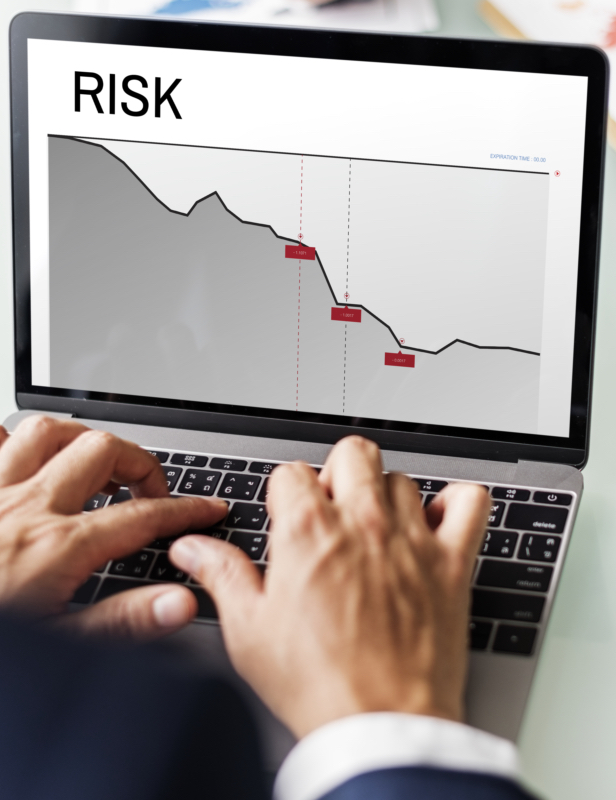The attraction of investment is often seen as a simple way to get rich quick.
The ever present “buy buy sell sell” that comes from any movie where the stock market features, gives the impression that this high paced environment is a great way to build your wealth and build it quickly. However, the reality is quite different as investing is not without its risks.
With this in mind, one of the most important things to consider before starting to invest your hard-earned money is “what is your appetite for risk?” Knowing the answer to this question will help you make informed decisions around your investments and therefore align them with your financial goals.
One thing to note is no investment, not even a cash deposit, is without risk. As such, it is not about seeking to completely avoid risk with your money. Rather, it is about managing your risk effectively by gaining an understanding of how the various risks interact with each other. Examples of risk that all investors face include:
- the risk of inflation remaining higher than the interest earned on savings account
- the risk of not achieve a good enough return to meet your retirement goals
- the risk of running out of money before you die
- the risk of taking your money out of an investment when values have fallen.
All these risks require careful consideration. However, this article relates specifically to investment risk also known as volatility where you experience fluctuations of your funds both down as well as up.
What is an investment risk appetite?
A risk appetite is very simply an individual’s willingness and tolerance for taking on investment risks. Or how willing are you to potentially lose money on a volatile investment? With great risk can come great rewards, but not all people are in a position financially or mentally to take such a gamble. And that is okay. You do not have to put all your money on black. Each investor will have a different appetite for risk and knowing what yours is requires thought, honest personal reflection, and an understanding of your finances and what your long-term goals are.

What might effect your investment risk appetite?
There are both situational and psychological factors that can influence how much risk you are willing to take. The sum of money you are starting with and your goal for that money are a good place to begin. Are you looking for an increase in the short term, say for a house deposit or school fees? Or are you looking to increase your emergency fund or retirement pot? How financially secure are you? What is your income stream like? Do you have health issues which require consistent funds to cover? If things go south with your investment, are you running the risk of going bankrupt?
Then you should consider how much stress you can manage. Will you have sleepless nights if the investment dips? Will you be counting every cent you lose when the market fluctuates? Are you patient enough to play the long game and let the market ebb and flow as it tends to do? If the answer to these questions is “no” than you might want to forgo the high risk investments and find a more balanced plan.
How do I know my investment risk tolerance?
It starts with the second set of questions above. Money is a very emotive subject, whether you are openly aware of that or not. We all need it, and most of us want more than we have. If this is you, what do you want that money for? What is your goal with investing? What is your plan for your money? What matters to you in life that your finances can help you support and achieve?
Once you know this you, potentially with the help of a financial advisor, will be in a better position to decide what investment strategy is best for you.
We also cannot ignore a person’s background. How you grew up financially will have an impact on how you feel about risk. Whether money was prevalent or scarce in your youth, whether it was discussed or kept secret, whether you learned how to manage your money or not, all of these factors will have an impact on your relationship to your finances. A person from a less financially secure background might be less inclined to take risks with their money as it was a precious commodity growing up. A person from a very secure financial background might be willing to take some chances as there was never a need to be careful with your cash. This won’t prove true for every investor, but it is an example of the psychological factors at play when it comes to risk appetite.
If you would like a bit more insight into how to understand your relationship with money, check out or previous article on The Psychology of Money.
Now I know my tolerance for risk. How do I decide what to do?
Firstly, this is where working with a financial advisor can come in handy. One of the very first things they will do is uncover your appetite for risk and help you understand it. Once you are both on the same page, they can recommend a strategy that both aligns with your goals, and correctly feeds your appetite for risk. If you are less inclined towards risk, one of the key concepts that you FA will discuss with you is diversification.
Diversification is having multiple investments across different products. Whether those be stocks, bonds, property, spreading out where your money is means that your portfolio is not dependant on one specific investment. This means that if a stock has a bad day, only a portion of your portfolio is affected. No one single investment can make or break your financial status.
It is also important that your portfolio is review regularly and adjusted if need be. This is to ensure it is still on par with your risk appetite, aligned to your financial goals, and that your money is working in the best way it can for you. Again, another thing a financial advisor can guide you on.

Striking the right balance between risk and reward
The bottom line when it comes to your appetite for risk is that you have found the balance that works for you. What you are capable of coping with will be different than anyone else. What’s most important is that you have found a strategy that has the potential for financial growth and allows you a good night’s sleep. You do not need to be kept up at night worrying about your investments. Money on its own can cause enough anxiety. Taking chances that will leave you feeling insecure will not make your life better. It will only increase the stress level around your finances, which is the exact opposite of what investing aims to do.
If you need guidance to start or grow your portfolio, give Bigmore Associates a call. Our mission is to ease your worries and help you feel confident in your financial decisions. We pride ourselves on the way we get to know our clients as this is how you yield the best results. Finances are a bespoke thing. If 100 people walk in the door, there will be 100 different profiles and portfolios built. And we love the challenge of ensuring that we have delivered the best one for you.
If you'd like to set up a free, no obligation meeting with one of our team fill out the contact form below.
 A Look at Pension Contributions and Their Advantages
Previous post
A Look at Pension Contributions and Their Advantages
Previous post
